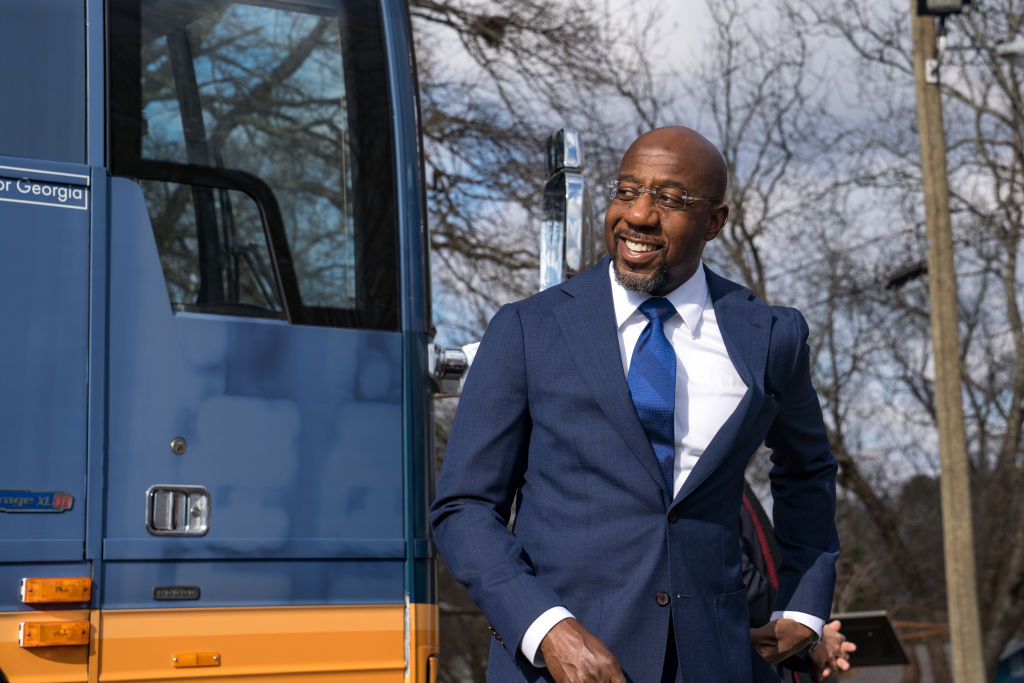In 1st sermon since Senate win, Warnock says U.S. can't change until it faces the 'sickness of our situation'


A free daily email with the biggest news stories of the day – and the best features from TheWeek.com
You are now subscribed
Your newsletter sign-up was successful
In his first sermon since winning his Senate race on Tuesday, Rev. Raphael Warnock told worshipers at the historic Ebenezer Baptist Church in Atlanta that he wanted to talk to them about "God's victory over violence."
On Wednesday, one day after Warnock was elected Georgia's first Black senator and fellow Democrat Jon Ossoff was elected the state's first Jewish senator, a pro-Trump mob stormed the Capitol. "Just as we were trying to put on our celebration shoes, the ugly side of our story — our great and grand American story — began to emerge as we saw the crude and the angry and the disrespectful and the violent break their way into the people's house, some carrying Confederate flags, signs and symbols of an Old World Order passing away," said Warnock, the senior pastor at Ebenezer Baptist Church.
"They were not protesters, they were rioters, tearing up the people's house, and they were handled with the kind of kid gloves with humanity," Warnock continued. "One could not help but juxtapose that to the response to those who were responding this summer to the deaths of George Floyd and the death of Breonna Taylor, those who rose up in peaceful, nonviolent struggle, and were met with brute force."
The Week
Escape your echo chamber. Get the facts behind the news, plus analysis from multiple perspectives.

Sign up for The Week's Free Newsletters
From our morning news briefing to a weekly Good News Newsletter, get the best of The Week delivered directly to your inbox.
From our morning news briefing to a weekly Good News Newsletter, get the best of The Week delivered directly to your inbox.
The U.S. must face what happened on Wednesday, he said, acknowledging that "we cannot and we will not change until we confront or are confronted by the sickness of our situation. That applies to individuals, that applies to institutions, that applies to nations. You can never get better until you have an actual diagnosis."
A free daily email with the biggest news stories of the day – and the best features from TheWeek.com
Catherine Garcia has worked as a senior writer at The Week since 2014. Her writing and reporting have appeared in Entertainment Weekly, The New York Times, Wirecutter, NBC News and "The Book of Jezebel," among others. She's a graduate of the University of Redlands and the Columbia University Graduate School of Journalism.
-
 How the FCC’s ‘equal time’ rule works
How the FCC’s ‘equal time’ rule worksIn the Spotlight The law is at the heart of the Colbert-CBS conflict
-
 What is the endgame in the DHS shutdown?
What is the endgame in the DHS shutdown?Today’s Big Question Democrats want to rein in ICE’s immigration crackdown
-
 ‘Poor time management isn’t just an inconvenience’
‘Poor time management isn’t just an inconvenience’Instant Opinion Opinion, comment and editorials of the day
-
 Nobody seems surprised Wagner's Prigozhin died under suspicious circumstances
Nobody seems surprised Wagner's Prigozhin died under suspicious circumstancesSpeed Read
-
 Western mountain climbers allegedly left Pakistani porter to die on K2
Western mountain climbers allegedly left Pakistani porter to die on K2Speed Read
-
 'Circular saw blades' divide controversial Rio Grande buoys installed by Texas governor
'Circular saw blades' divide controversial Rio Grande buoys installed by Texas governorSpeed Read
-
 Los Angeles city workers stage 1-day walkout over labor conditions
Los Angeles city workers stage 1-day walkout over labor conditionsSpeed Read
-
 Mega Millions jackpot climbs to an estimated $1.55 billion
Mega Millions jackpot climbs to an estimated $1.55 billionSpeed Read
-
 Bangladesh dealing with worst dengue fever outbreak on record
Bangladesh dealing with worst dengue fever outbreak on recordSpeed Read
-
 Glacial outburst flooding in Juneau destroys homes
Glacial outburst flooding in Juneau destroys homesSpeed Read
-
 Scotland seeking 'monster hunters' to search for fabled Loch Ness creature
Scotland seeking 'monster hunters' to search for fabled Loch Ness creatureSpeed Read
